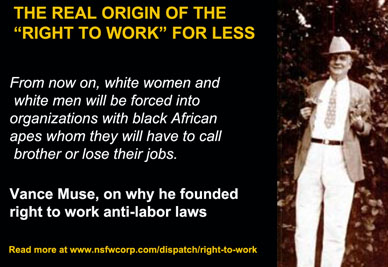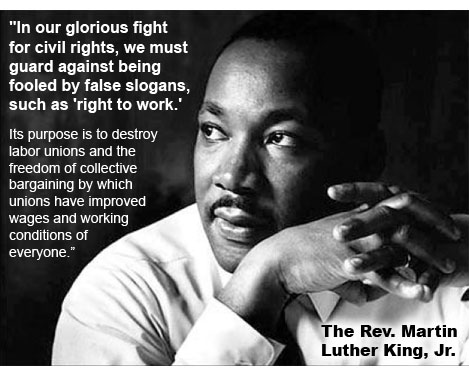STATE GOVERNMENT
Republicans push anti-union ‘Right-to-Work’ in both Washingtons
State, federal legislation introduced to cripple labor movement
By DAVID GROVES
The Stand
 (Feb. 2, 2017) — Republicans in the Washington State Legislature and Congress are introducing bills this week that would institute so-called “right-to-work” policies in Washington and nationally, an attempt to deliver a severe blow to the labor movement and weaken workers’ collective bargaining rights at the behest of U.S. corporations.
(Feb. 2, 2017) — Republicans in the Washington State Legislature and Congress are introducing bills this week that would institute so-called “right-to-work” policies in Washington and nationally, an attempt to deliver a severe blow to the labor movement and weaken workers’ collective bargaining rights at the behest of U.S. corporations.
Right-to-work laws ban unions and employers from agreeing to union-security contract clauses, which allows workers to stop paying for representation while still requiring the union to represent them. It would be akin to allowing people to opt out of paying taxes, but still requiring the government to provide the same services to taxpayers and free-riders alike.

 On Wednesday, state Sens. Michael Baumgartner (R-Spokane) and John Braun (R-Centralia) introduced state right-to-work legislation, SB 5692. It is scheduled for a public hearing at 1:30 p.m. on Wednesday, Feb. 8 in the Senate Commerce, Labor & Sports Committee. Historically, state right-to-work bills have been introduced by a handful of extreme right-wing Republicans, but the bills rarely get hearings and have no chance of passage. The difference this year is that Baumgartner chairs the committee that will hear the doomed bill.
On Wednesday, state Sens. Michael Baumgartner (R-Spokane) and John Braun (R-Centralia) introduced state right-to-work legislation, SB 5692. It is scheduled for a public hearing at 1:30 p.m. on Wednesday, Feb. 8 in the Senate Commerce, Labor & Sports Committee. Historically, state right-to-work bills have been introduced by a handful of extreme right-wing Republicans, but the bills rarely get hearings and have no chance of passage. The difference this year is that Baumgartner chairs the committee that will hear the doomed bill.
There’s also nothing new about such proposals being introduced in Congress. But given Republican control of both houses of Congress and the White House, unions and their allies are more alarmed about this year’s effort. The nationwide right-to-work effort is being sponsored by Rep. Joe “You lie!” Wilson (R-S.C.) and Steve King (R-Iowa), who last year infamously wondered aloud what non-whites had done to benefit civilization.
 Right-to-work laws have roots in Southern racism and the Jim Crow-era quest for super-exploited labor. They are used to justify racial exclusion, weaken established collective bargaining agreements, and financially cripple unions so they can’t help workers organize. Once confined to states in the South, Republican-controlled states like Michigan and Wisconsin have adopted right-to-work laws in recent years with the support of conservative billionaire industrialists like the Koch brothers. States where the GOP just gained control following the 2016 elections, including Missouri and New Hampshire, are making right-to-work laws their first order of business in 2017.
Right-to-work laws have roots in Southern racism and the Jim Crow-era quest for super-exploited labor. They are used to justify racial exclusion, weaken established collective bargaining agreements, and financially cripple unions so they can’t help workers organize. Once confined to states in the South, Republican-controlled states like Michigan and Wisconsin have adopted right-to-work laws in recent years with the support of conservative billionaire industrialists like the Koch brothers. States where the GOP just gained control following the 2016 elections, including Missouri and New Hampshire, are making right-to-work laws their first order of business in 2017.
The following statement by AFL-CIO President Richard Trumka was released Wednesday regarding the national “right to work” bill:
Right to work is a lie dressed up in a feel-good slogan. It doesn’t give workers freedom — instead, it weakens our right to join together and bargain for better wages and working conditions. Its end goal is to destroy unions. Numbers don’t lie. Workers in states with right to work laws have wages that are 12% lower. That’s because unions raise wages for all workers, not just our members.
A recent Pew survey shows that 60% of Americans — an overwhelming majority — support unions. Americans clearly see the value of coming together with their co-workers to tackle inequality. Right to work isn’t the will of the people, it’s legislation pushed on working people by out-of-touch corporations that want to ship jobs overseas, cut health and safety protections, and pay lower wages. This is an attempt by corporate CEOs to further tip the scale even more in their favor, at working people’s expense.
Working people were loud and clear in this past election. We want an economy that works for all, not just corporations. We know we need to rewrite the rules of the economy so that policies like bad trade deals and right to work aren’t the new norm. President Trump has said he supports unions and the people who are our members. He has stood up to corporate Republicans on trade. We call on him to do the same on right to work, and to stand up for every worker’s right to join a union.






